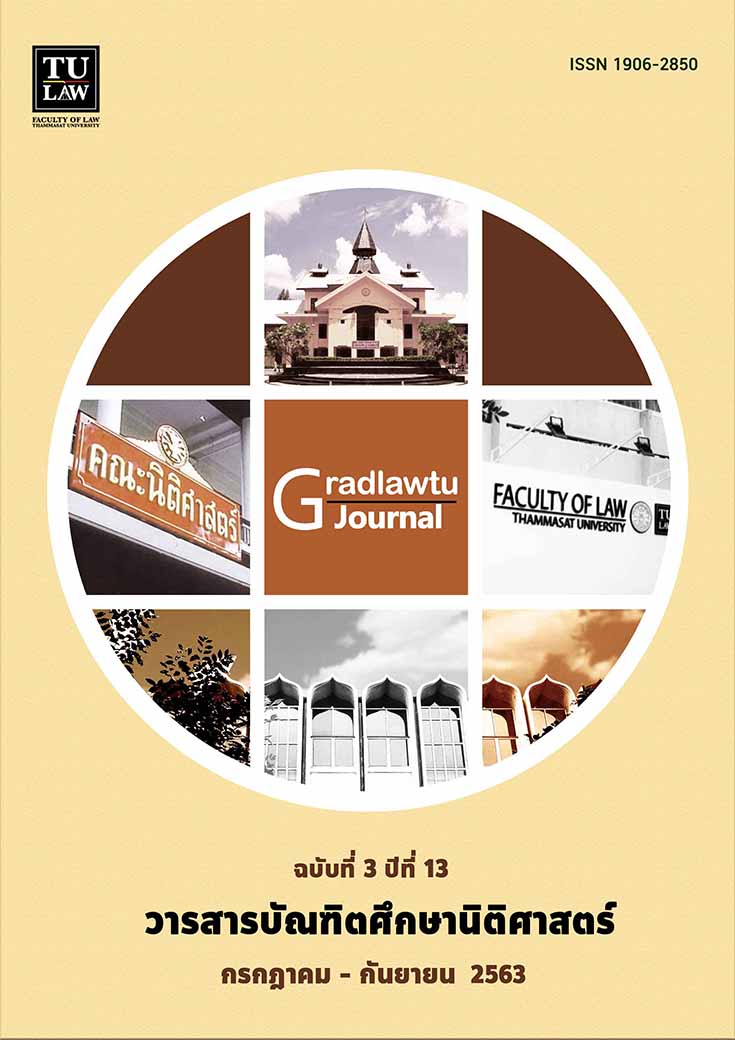AIRBNB: THE LEGAL EFFECT OF THE SHARING ECONOMY UPON DISRUPTIVE INNOVATION
Keywords:
Short-term rental, Airbnb, Sharing Economy, Disruptive innovationAbstract
As technology steadily influences human lives, Airbnb, Inc has attracted attention as an online platform advertizing short-term property rentals, including hotels, hostels, condominiums, apartments, and homestays accessed at https://www.airbnb.com or by mobile application. Airbnb is developed by the consumer to consumer (C2C) sharing economy. This business model facilitates e-commerce between business entities and perspective tourists in an online environment for booking services and assisting in problem-solving during stays at properties.
Airbnb induces change in consumer behavior from traditional hotel industry focus solely on hotels on online platforms. Consequently, the Airbnb platform is a disruptive innovation causing several legal issues. An international comparative legal study was made of relevant Thai regulations, compared to municipal laws in New York and San Francisco, the United States of America (USA).
Results were that the USA has enacted regulations to cope with Airbnb. New York conservatively launched a strict crackdown on Airbnb. By contrast, San Francisco independently legalized short-term rental businesses to protect its hotel business and neighborhoods. Nevertheless, many problems remain with Airbnb-related legal issues, for which Thai law currently offers
no government-approved solution.
These findings suggest that legislation be introduced for short-term rental businesses to facilitate the Airbnb-related laws of San Francisco, taking into account different societal, economic, and cultural contexts. A regulatory sandbox experiment, in which innovators conduct live experiments in a controlled environment under a regulator's supervision, might be considered to create a model for analyzing legal aspects of Airbnb in terms of existing rules to cope with the many problems caused by this business model and enact suitable legislation for Thailand.
References
1.ส่วนรักษาความสงบเรียบร้อย 3 สำนักการสอบสวนและนิติการ กรมการปกครอง กระทรวงมหาดไทย. คู่มือการปฏิบัติงานกฎหมายโรงแรม. ปทุมธานี: โรงพิมพ์อาสารักษาดินแดน กรมการปกครอง,2560.
บทความวารสาร
2.จักรี อดุลย์นิรัตน์. “ปัญหากฎหมายเกี่ยวกับการนำห้องชุดคอนโดมิเนียมให้เช่าระยะสั้น.” วารสารนิติศาสตร์ มหาวิทยาลัยนเรศวร. ปีที่ 1. ฉบับที่ 2. (กรกฎาคม-ธันวาคม 2561): 72.
Articles
3.Apallonia C. Wilhelm. "Sharing Is Caring: Regulating Rather than Prohibiting Home Sharing in Wisconsin." Marquette Law Review, vol. 101. no. 3. (2018): 829.
4.Dana Palombo. "A Tale of Two Cities: The Regulatory Battle to Incorporate Short-Term Residential Rentals into Modern Law." American University Business Law Review. vol. 4. no. 2. (2015): 297-298.
5.Emily M. Speier. "Embracing Airbnb: How Cities Can Champion Private Property Rights without Compromising the Health and Welfare of the Community." Pepperdine Law Review, vol. 44. no. 2. (2017): 410-411.
6.Jason McCloskey. "Discriminatorybnb: A Discussion of Airbnb's Race Problem, Its New Anti-Discrimination Policies, and the Need for External Regulation." Washington University Journal of Law & Policy. 57. (2018): 206.
7.J. T. Minor. "Foregoing the Cleaver for the Scalpel: How New York Can Add Some Nuance to Its Short-Term Rental Laws." Iowa Law Review. vol. 103. no. 2. (January 2018): 822-823.
8.Mark Fenwick; Wulf A. Kaal; Erik P.M. Vermeulen. "Regulation Tomorrow: What Happens When Technology Is Faster than the Law." American University Business Law Review vol. 6. no. 3. (2017): 591-592
Stephanie J. Knightly. "Regulating Innovation: The Positive Economic Impact of Taxing Airbnb like the Hotel Industry." Suffolk University Law Review. vol. 51. no. 3. (2018): 468.
9.Stephen R. Miller. "First Principles for Regulating the Sharing Economy." Harvard Journal on Legislation. vol. 53. (2016): 151-172.
10.Tess Hofmann. "Airbnb in New York City: Whose Privacy Rights Are Threatened by a Government Data Grab." Fordham Law Review. vol. 87. no. 6. (May 2019): 2594.
11.Wilson Chow. "Air Banned and Barred: Why New York City’s Affordable Housing Crisis Has No Room for Short-Term Rentals." Brooklyn Journal of Corporate Financial & Commercial Law, vol. 13. no. 2. (2019): 419-420.
วิทยานิพนธ์
12.อัจฉรียา ตันวิตรานนท์. “ปัญหาความรับผิดของผู้ประกอบธุรกิจขนส่งที่ไม่ได้รับอนุญาต : กรณีศึกษาอูเบอร์.” วิทยานิพนธ์นิติศาสตรมหาบัณฑิต สาขาวิชานิติศาสตร์ คณะนิติศาสตร์ จุฬาลงกรณ์มหาวิทยาลัย, 2560.
สื่ออิเล็กทรอนิกส์
13.ฐานเศรษฐกิจ. “คอนโดผวา !! เตือนปล่อยเช่า Airbnb ผิด กม. เสี่ยงคุก https://www.thansettakij.com /content/28989828, 28 มกราคม 2563.
14.ตลาดหลักทรัพย์แห่งประเทศไทย. “Fintech…เทคโนโลยีทางการเงินในยุคดิจิตอล และประโยชน์สำหรับนักลงทุนยุคใหม่.” https://www.set.or.th/dat/vdoArticle/attachFile/AttachFile_1456398 364860.pd, 11 กุมภาพันธ์ 2563.
15.ธนาคารแห่งประเทศไทย. “แนวปฏิบัติ เรื่อง แนวทางการเข้าร่วมทดสอบและพัฒนานวัตกรรมที่นำเทคโนโลยีใหม่มาสนับสนุนการให้บริการทางการเงิน (Regulatory Sandbox).” https://www.bot.or.th/Thai/Financial Institutions/PruReg_HB/Doc_Form/Docs_Manual/แนวปฏิบัติ%20Regulatory%20Sandbox%20วันที่%2015%20มีค%2062.pdf, 11 กุมภาพันธ์ 2563.
16.ปราณี สุทธศรี และคณะ,” Sharing Economy : นัยต่อเศรษฐกิจไทย.” https://www.bot.or.th/Thai/Monetary Policy/EconomicConditions/AAA/SharingEconomy_V8.pdf, 1 กุมภาพันธ์ 2563.
17.โพสต์ทูเดย์. “สมาคมโรงแรมไทยบุกหารือมหาดไทยแก้ปัญหาที่พักประเภทAirbnb.”.https://www.posttoday. com/social/general/606284, 28 มกราคม 2563.
รายงานของคณะคณะกรรมาธิการขับเคลื่อนการปฏิรูปประเทศด้านเศรษฐกิจ สภาขับเคลื่อนการปฏิรูปประเทศ เรื่อง “การปฏิรูประบบที่พักแรมและระบบคนเข้าเมือง.” https://library2.parliament. go.th/giventake/content_nrsa2558/d022060-01.pdf, 19 กุมภาพันธ์ 2563.
18.สำนักงานคณะกรรมการกิจการกระจายเสียง กิจการโทรทัศน์ และกิจการโทรคมนาคมแห่งชาติ. “เอกสารประกอบการรับฟังความคิดเห็นสาธารณะ ร่างประกาศ กสทช. เรื่อง หลักเกณฑ์การอนุญาตให้ใช้คลื่นความถื่เพื่อการพัฒนาและทดสอบนวัตกรรมในพื้นที่กำกับดูแลเป็นการเฉพาะ (Regulatory Sandbox).”http://www.nbtc.go.th/getattachment/News/ข่าวรับฟังความคิดเห็น/37008/ เอกสารประกอบการรับฟังความคิดเห็นฯ.pdf.aspx,11 กุมภาพันธ์ 2563.
19.ห้องสมุดมารวย ตลาดหลักทรัพย์แห่งประเทศไทย. “Disruptive Innovation ความท้าทายของโลกยุคใหม่,” https://www.maruey.com/article/contentinjournal/692, 18 กุมภาพันธ์ 2563.
20.ศิริชนก วิริยเกื้อกูล. “กฎหมายควบคุมการให้เช่าที่พักอาศัยรูปแบบใหม่เพื่อการท่องเที่ยว แอร์บีเอ็นบี (Airbnb).” https://library2.parliament.go.th/ebook/contentissue/ 2560/hi2560-024.pdf, 2 กุมภาพันธ์ 2563.
Electronic Materials
21.Airbnb. “San Francisco’s Registration Process: Frequently Asked Questions.” https://www.airbnb.com/help/article/1849/san-franciscos-registration-process-frequently-asked-questions, February 13, 2020.
22.Office of Short-Term Rentals, “Become a Certified Host.” https://shorttermrentals.sfgov.org, February 12, 2020.
Downloads
Published
Issue
Section
License
บทความหรือข้อความคิดเห็นใด ๆ ที่ปรากฏในวารสารบัณฑิตศึกษานิติศาสตร์เป็นความรับผิดชอบของผู้เขียนบทความโดยเฉพาะ คณะนิติศาสตร์ มหาวิทยาลัยธรรมศาสตร์ และกองบรรณาธิการไม่จำเป็นต้องเห็นด้วย



